We are developing the social individualist meta-context for the future. From the very serious to the extremely frivolous... lets see what is on the mind of the Samizdata people.
Samizdata, derived from Samizdat /n. - a system of clandestine publication of banned literature in the USSR [Russ.,= self-publishing house]
|
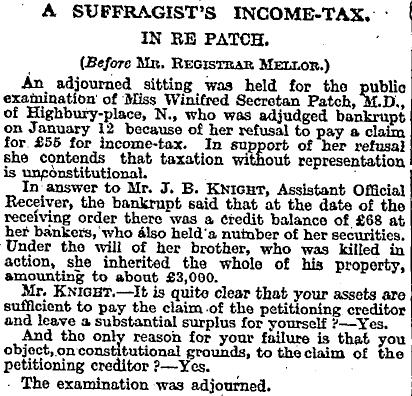 The Times 28 February 1917 p4 And no representation without (net) taxation one might add.
I did some searching to see what happened in this case but to no avail. I presume the state got its money in the end. As to the good lady herself there seems to be some sort of medical prize in her name.
In 1917, as this cutting shows, the German navy shelled Margate and Broadstairs. Nothing strange in that, you might think, they had done much worse to Scarborough and Great Yarmouth.
 The Times 27 February 1917 p6. Right click for the whole article. However, this raid was a bit different. Far from causing general mayhem and tweaking the tail of the Royal Navy, on this occasion the target was one man: Lord Northcliffe, proprietor of The Times, The Daily Mail and – I kid you not – The Daily Mirror. Not that you would know it from this heavily censored report.
Northcliffe had attracted the ire of the German government by – apparently, I get little impression of this from The Times itself – being the main cheerleader of anti-German and pro-War sentiment in Britain. In 1918, doubtless aided by the Kaiser’s ringing, if unintentional, endorsement, Northcliffe became Britain’s Director of Propaganda.
I appreciate that in writing this article I may be giving the God-Emperor some ideas. So, Donald, if you’re reading, just remember: sailing a battleship up the Hudson, shelling the New York Times building and turning it into a smoking pile of rubble just so you can wipe the smile off the faces of a bunch of smug, arrogant, conceited, snobbish, self-satisfied, aloof, out-of-touch, blockheaded, group-thinking, bubble-dwelling, histrionic, paranoid, lying, devious, dissembling, childish, cry-baby, bitter, vindictive, divisive, conspiratorial, freedom-hating, progress-denying communists… is not nice.
It may even be wrong.
Milo Yiannopolous seems to have got himself into a spot of bother over remarks about homosexual sex with teenagers. The gist of it – especially if you read his clarification – seems to be that he was ready to take it up the bum at 13 and if it was OK for him then it would probably be OK for others. I suspect – given the little I know about him – that Milo at that age would have been capable of weighing up the pros and cons of such a decision. But not many others.
Milo raises – albeit indirectly – an important question: when does a child become an adult? As it happens, I drafted an attempt at an answer to this some time ago but lacked the guts to publish it. It’s time I did:
As the law stands if a man has sex with a female of 15 years and 364 days he is a scoundrel who should be imprisoned for a very long time. However, if he has sex with a female of 16 years and 0 days that’s just fine and dandy.
Or to put it another way, in the opinion of the law all women undergo the transition from young, innocent child to responsible, rational adult in a split second at exactly the same age.
That’s absurd; but, for the law, hardly uncommon. Similar rules apply to all sorts of aspects of growing up: when you can drive a car, enter into contracts, vote, marry, drink alcohol, leave school, get a job etc. And in each case the state’s answer is some arbitrary, one-size-fits-all number. And often it is a different number: 17 for driving (I am referring to English law here), 18 for drinking, 16 for sex. That can’t be right.
Could there perhaps, be a solution that is – to paraphrase H. L. Mencken – simple, neat and not wrong? The argument for numbers is that you have to draw the line somewhere, meaning: the law has to draw the line somewhere. But why should it be the law drawing the line? Why can’t it be the child? What if when the child comes to the decision that he is old enough to take on the rights and responsibilities of adulthood he just does? Obviously, he would have to tell people but that implies some sort of arrangement not unlike marriage with documents, ceremonies and cooling-off periods. Hardly beyond the wit of man.
I’ve been trying to think up some drawbacks. One might be that a girl’s declaration of adulthood might look awfully like a declaration that she wanted to have sex. And women are a bit coy about that sort of thing. Another might be that some children would decide to become adults at an absurdly young age and then proceed to ruin their lives, perhaps by driving the car into a bunch of passers-by. Or drinking themselves to death. But how likely is that? My personal experience of childhood is that I was perfectly well aware of my unpreparedness for taking on the responsiblities of adulthood. Perhaps we should be more worried about the other end of the age scale. Would some people choose to extend their childhood into their 20s and beyond?
Perhaps one way to look at this is to consider when we might ourselves have felt ready for the transition. In my case I think it was about 14-15. The only issue for me at that age would have been the predatory homosexuals who made up the school’s English Department.
That’s a line that the Rod Steiger character uses in the the 1970 film Waterloo. And it’s a line I have been repeating to myself again and again over the last few months.
My enemies in the Establishment, whether it be the media, communists, social justice warriors or the last-ditch Remainers have been obligingly making error after error. I could point out their mistakes and laugh but there is that danger – however remote – that they might listen and learn. You see, I don’t want them to learn. What I want them to do is to keep the gas pedal pressed down hard as they can as they drive the juggernaut of bad ideas over the cliff and into oblivion. In such circumstances it is best to keep ones counsel.
Even so, when Prince Charles co-authors a Ladybird book on climate change I feel obliged to comment. You see, I am rather fond of our vestigial monarchy. Don’t ask me why, I just am. But for the heir apparent to involve himself in a political argument at a time when his side is losing is madness.
Prince Charles hopes the new Ladybird book, which will be available from Thursday, will act as a simple guide to the topic and win over climate change sceptics.
It’s a Ladybird book. It’s aimed at children. That makes it indoctrination.
I loved this from one of his co-authors:
I don’t think there has ever been a Ladybird book before in the history of ladybird books to have been subject to multiple rounds of peer review…
Keeping the pedal to the metal and beyond.
There are times when I think that Brenda’s main motivation in staying alive is to prevent her son doing irreparable damage to the monarchy.

If you are a fan of Watford, Aston Villa or Lincoln City or just football in general you will be shocked and saddened by the news of the death of Graham Taylor at the age of 72.
He was a remarkable manager. He took Lincoln City from the Fourth to the Third Division. He took Aston Villa from the Second Division to runners-up in the First. He took England to the 1992 European Championships and successfully kept them out of the 1994 World Cup.
But it was with Watford he had his greatest success. Teaming up with Elton John in 1977 he quickly won promotion to the Third Division. Shortly afterwards he gave a talk at my old school. In the Q&A one of the cheekier boys asked him when we would be in the First Division. How we laughed. It was unthinkable. Not going to happen. Taylor replied that if you aim for the ceiling your feet won’t get off the ground but if you aim for the sky then you may hit the ceiling. Four years later having smashed through the ceiling, roof and lower troposphere we were indeed in the First Division making monkeys out of the likes of Manchester United and Liverpool. [What’s changed? I hear you ask.] In 1983 Watford were the second-best team in the entire country. In 1984 they got to the final of the FA Cup.
For the benefit of North American readers unused to the joys of promotion and relegation the equivalent of all this might be the Montreal Expos winning the World Series or a Canadian team winning the Stanley Cup. Or, if you’re not interested in sport, somebody without political experience, a coherent philosophy, tact, media savvy or plausible hair becoming President of the United States. As I said: not going to happen.
Taylor even returned to Watford in the 1990s once again taking them from the Third to the First Division (or Premier League as it was by then known).
There were a number of secrets to his success. One was fitness: it was essential that his teams could keep going for the full 90 minutes. Another was the employment of the sublimely-talented John Barnes and the sublimely-passionate Luther Blissett at a time when many of the big teams were reluctant to field black players. Another was going back to the stats and working out that the traditional English long-ball game was by far the most effective. This was indeed fortunate as to attempt to pass the ball on the notoriously glutinous Vicarage Road pitch of the 1980s was to engage in cruelty to spherical objects.
On Saturday, Watford are playing at home. The club and fans will attempt to honour Taylor’s memory – many already have via the #thankyougt hashtag. But it will be difficult. Graham Taylor was a remarkable manager – and by all accounts – a true gentleman. Watford owes him a huge debt.
From Instapundit (my emboldenings):
The miniature Perdex drones, different from larger, more common remotely piloted vehicles (RPVs) like the well-known Reaper and Predator, operate with a high degree of collective autonomy and reduced dependency on remote flight crews to control them. The large group of more autonomous Perdex drones creates a “swarm” of miniature drones. The swarm shares information across data links during operation, and can make mission-adaptive decisions faster than RPV’s controlled in the more conventional manner.
In a statement released by the U.S. Department of Defense, Strategic Capabilities Office Director William Roper said, “Due to the complex nature of combat, Perdix are not pre-programmed synchronized individuals, they are a collective organism, sharing one distributed brain for decision-making and adapting to each other like swarms in nature,” Director Roper went on to say, “Because every Perdix communicates and collaborates with every other Perdix, the swarm has no leader and can gracefully adapt to drones entering or exiting the team.”
Doctor Who fans will know exactly where this sort of thing leads:
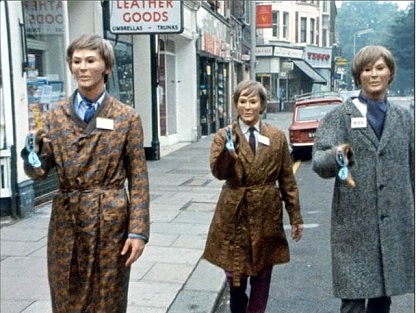
You have been warned.
Patsy Cornwallis-West was at one time mistress to the Prince of Wales, the future Edward VII. By the First World War she was a woman in her fifties married to a highly respectable retired colonel in his late seventies.
Her son, George, married one Jennie Jerome, mother of one Winston Churchill before marrying one Mrs Patrick Campbell. But that’s another story.
It would appear that Mrs Cornwallis-West was not entirely satisfied with her septugenarian husband and developed a “more than ordinary interest” in a young officer recently promoted from the ranks and recently wounded. When the young officer failed to reciprocate she started to pull strings. One of these strings was attached to the Quartermaster General.
Soon afterwards, the officer found that he had been transferred to another battalion. This may not sound like a big deal to you or me but it was clearly a huge deal to everyone involved at the time. My guess is that soldiers are deeply attached to their battalions especially when there’s a war on.
This was not the end of the matter. Questions were asked in Parliament and – I kid you not – a special Act – the Army (Courts of Inquiry) Act – was passed to create a committee to look into this one case (well, two actually, but the other one doesn’t concern us). The upshot was that the junior officer was exonerated, his commanding officer fired, Cornwallis-West censured and the Quartermaster General, ahem, informed of the “displeasure of the government”.
That such an effort could be made to secure justice in the middle of a war for a single subaltern who for all I know got killed anyway and may well not even have had the vote is staggering. And magnificent.
Which brings us on to the linked article. The Quartermaster General concerned was a chap called Sir John Cowans. The job he had in supplying the biggest army in British history was immense. And it would appear that he was very good at it. Clearly, scandal or no scandal, a lot of people wanted to keep him in his post. Hence (probably) this article from the Times Military Correspondent singing his praises.
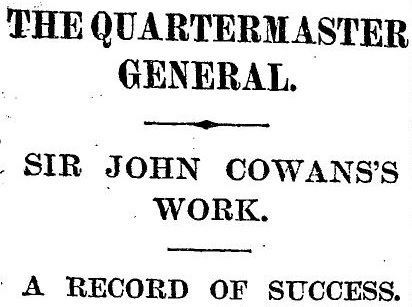 The Times 5 January 1917 p3 I particularly liked this bit:
For example, when the frost-bite first became a danger, an urgent demand for a new anti-frost-bite grease reached him from France late one Monday night. On Tuesday morning he had assembled the chief tallow merchants at his office, and by the Thursday night thousands of tins of this new remedy were on their way to France.
Justice was one thing but the heavens falling was another.
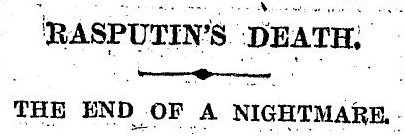 The Times 4 January 1917 p7
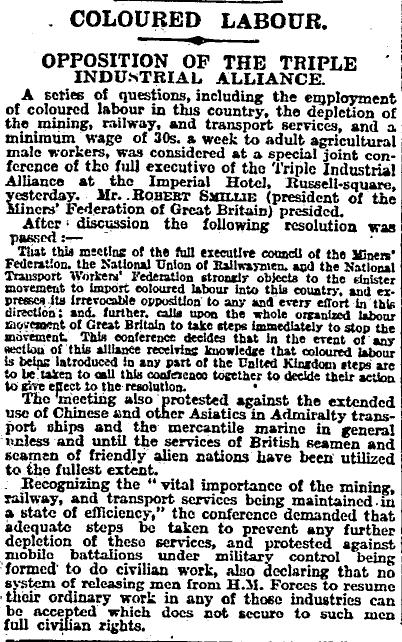 The Time 22 December 1916
Things were looking good for the Allies at the close of 1916. The French had pushed back the Germans at Verdun. The British were consistently doing much the same on the Somme. The Russians had made huge gains at the expense of the Austrians during the Brusilov Offensive. The Italians were continuing to attack and it appeared that it was finally all systems go on the Salonika Front. The only real fly in the ointment was Romania which was being invaded.
Away from the frontlines there was also plenty of scope for optimism. The British were at last getting guns and shells in sufficient quantities. The Irish rebellion had been crushed. The U-boat campaign was quiescent. Conscription seemed to be working. Even the Russians seemed to have turned the corner when it came to their supply problems.
Most importantly, the Western Allies – and particularly the French under a dashing young commander – appeared to have found the formula for winning battles on the Western Front.
Meanwhile the Germans were slowly and literally being starved by a combination of the Blockade and their own economic incompetence. Splits were beginning to appear with the communist, Karl Liebnecht demanding an end to the war. At the same time they were having to prop up their increasingly helpless allies. In Austria, the death of Emperor Franz Josef followed on the heels of the assassination of the Prime Minister by another communist in protest at the continuing refusal to recall parliament.
It must have looked like victory was just around the corner. In such situations you often find that unscrupulous politicians like to jockey for position in order to be able to take the credit. Not that such things would ever happen in Britain.
On 6 December, having out-manoeuvred his predecessor, David Lloyd George became Prime Minister.
Oh and the name of that dashing French commander – he of the formula? Nivelle. Robert Nivelle.
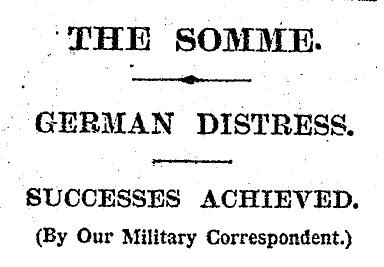 The Times 28 September 1916
A chap called Ricky Vaughn posted this to Gab:
 No Reagan or Thatcher. No Paul Joseph Watson or Stefan Molyneux either.
“Ah, it’s a homage to The Beatles’ Sergeant Pepper’s Lonely Hearts Club Band album cover. How clever.” I thought.
“Let’s see who’s here.”
“Well there’s Nige, Ron Paul, Pepe (of course), Ann Coulter, Milo, Harambe (heh!), Joseph McCarthy, Scott Adams. All good or good-ish stuff. Well maybe not Pepe. Or Harambe.”
“Who’s that skulking in the shadows?”
“Oh shit, it’s that Norwegian mass murderer!”
“And hang about that’s Gaddafi!”
“And that’s…”
By my count it’s 4 tyrants, 1 fascist leader, 2 mass murderers and 1 serial killer. And that’s the ones I recognise.
The disturbing thing is that this image may well be accurate. These people represent the intellectual (stop sniggering. Seriously, stop sniggering) underpinnings of the Trump presidency. Obviously, there are serious differences which will probably lead to serious subsidence.
But there are things that unite them. With the exception of Farage, I cannot think of any who would have been on the right side of history in 1939. Which is remarkable. Even Neville Chamberlain got that one right.
They are also united by a loathing of the establishment. Which I loathe too. The UN, the EU, the welfare state, crony capitalism, fiat money, political correctness, climate alarmism, regulation after regulation after regulation: they’ve all got to go. But in all of that happening all sorts of other things may happen. One can only hope those things are nearer the Farage than Mosley end of the spectrum.
H H Monro – who wrote under the pen name Saki – was a writer of mainly short stories. In most of them the innocent and gullible find themselves in an unequal struggle with the sly and devious.
In his novel When William Came he wrote about what would happen in the event of a German invasion. It is not a particularly good novel but it does describe the process by which die-hard patriots find themselves ever more isolated as more and more of the smart set – desperate to carry on as before – adapt themselves to occupation
When war came, Monro was a man in his 40s and as such could have stood aside. Instead he joined up. He was killed on the Somme a hundred years ago yesterday.
One our regular-ish commenters posts under the same name as one of Saki’s recurring characters so it will be interesting to hear Clovis Sangrail’s take.

|
Who Are We? The Samizdata people are a bunch of sinister and heavily armed globalist illuminati who seek to infect the entire world with the values of personal liberty and several property. Amongst our many crimes is a sense of humour and the intermittent use of British spelling.
We are also a varied group made up of social individualists, classical liberals, whigs, libertarians, extropians, futurists, ‘Porcupines’, Karl Popper fetishists, recovering neo-conservatives, crazed Ayn Rand worshipers, over-caffeinated Virginia Postrel devotees, witty Frédéric Bastiat wannabes, cypherpunks, minarchists, kritarchists and wild-eyed anarcho-capitalists from Britain, North America, Australia and Europe.
|













